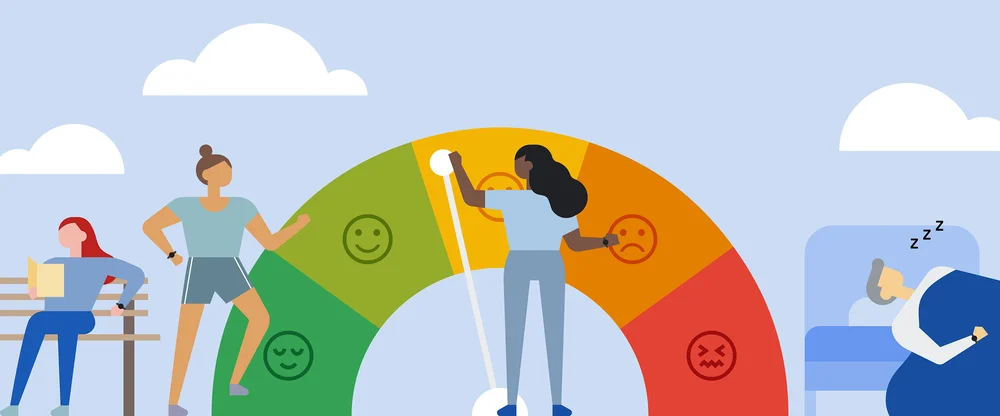Learn what triggers your stress with Body Response from Fitbit, get personalized sleep recommendations on your Nest Hub, and more.
Sweaty palms. Pounding heart. Red face. We’ve all experienced signs of stress — whether it’s for something we’re looking forward to, like a first date, or something more daunting, like a big test or a tight deadline. Stress is a normal, and sometimes challenging, part of our lives. So when it pops up, it’s important we know how to safely monitor, understand and manage it.
For National Stress Awareness Month, we’re sharing three ways Google products and features can help you better understand and manage your stress levels — from alerting you to signs of stress to sharing personalized tips for a better night’s sleep.
1. Learn how your body responds to stress
While shortness of breath or knots in your stomach are pretty obvious signs of acute stress (otherwise known as “in-the-moment stress”), others associated with chronic stress can be harder to recognize. Fitbit’s Body Response feature on Sense 2 eliminates the guesswork. It continuously measures heart rate, heart rate variability, skin temperature and electrodermal activity (tiny electrical changes on your skin) to recognize physical signs of stress and alert you when they happen. You can then log your mood directly on your Sense 2 or within the Fitbit app, and use your device to take action right away — like with a quick breathing exercise in the Relax app or a mindfulness exercise in Fitbit Premium.
Fitbit’s other stress management features can also help you learn how your body responds to different experiences. Fitbit Premium’s Daily Readiness Score takes into account your recent activity, sleep and heart rate variability — all of which can be affected when you’re stressed — and shares recommendations. For instance, it might suggest you take a rest day, with restorative activities like walking or stretching, instead of doing an intense workout.
2. Improve your sleep quality
Sleep and stress are closely related: If you’ve had a stressful day, you probably won’t sleep soundly that night… which makes you more vulnerable to stress the next day. If you’re caught in that endless cycle, try setting a bedtime reminder on your Fitbit device. These reminders can help you wind down and lower your stress levels with prompts like meditating before bed.
Sleep Profile, available with Fitbit Premium for Google Pixel Watch and Fitbit users, also shares monthly insights into your sleep patterns and suggestions to help you get a better night’s rest. Don’t like wearing something on your wrist at night? Nest Hub (2nd Gen) with Sleep Sensing uses motion and sound to monitor your sleep, and offers advice based on your patterns — like suggesting breathing exercises or reflective journaling before bed. It can also help you fall asleep and wake up more easily with automatic routines such as display dimming in the evening and Sunrise Alarm in the morning.

With features like Sleep Profile for Fitbit Premium users and Pixel’s Bedtime mode, you can manage daily stress better by ensuring you’re getting a good night’s sleep.
3. Cut down on screen time
A recent study from the National Institutes of Health found that excessive cell phone usage among adults is linked to higher stress levels. Pulling yourself away from emails and social media can be difficult. But moderating your technology use — especially at night, when your mind needs to rest — can ultimately improve your mental wellbeing. Instead of scrolling through an app, try an on-device breathing or mindfulness session with Fitbit Premium.
Pixel’s Digital Wellbeing feature also helps you monitor how you spend time on your Pixel phone, showing you insights like how frequently you unlock it and how long you use each app. To help reduce your screen time, try setting app timers, turning on Bedtime mode and limiting interruptions while you focus.
Once you better understand how your daily (and nightly) activities contribute to managing stress levels, you can develop routines that improve your health, relationships and more.






